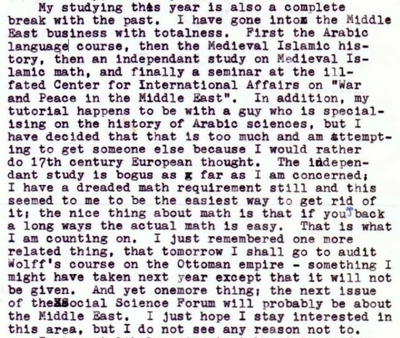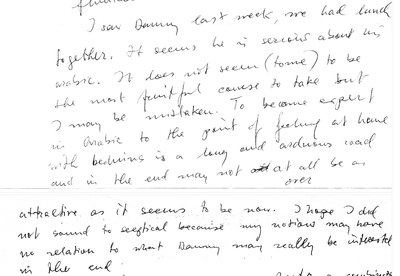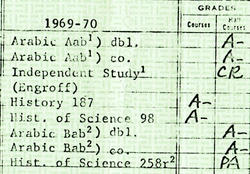At the start of my junior year in college, precisely fifty years ago this month, I changed my college major, making the leap from mathematics to Middle East studies. Math had become too hard, the region was too interesting.
I wrote about this life-altering move in a letter to my parents on Sep. 30, 1969 (mistakes are corrected, and references added):
My studying this year is also a complete break with the past. I have gone into the Middle East business with totalness. First, the Arabic language course [with Wilson B. Bishai], then Medieval Islamic history [with Richard Bulliet], then an independent study on Medieval Islamic math [with John Engroff], and finally a seminar at the ill-fated [because just attacked by 20-30 "Weathermen" on Sep. 25] Center for International Affairs on "War and Peace in the Middle East" [with Amos Perlmutter]. In addition, my tutorial happens to be with a guy [John Entelis] who is specializing on the history of Arabic sciences. ...
Daniel Pipes' college transcript.
I just remembered one more related thing, that tomorrow I shall go to audit [Robert] Wolff's course on the [history of the] Ottoman Empire - something I might have taken next year except that it will not be given. And yet one more thing: the next issue of the Social Science Forum [which I co-edited with Arthur Waldron] will probably be about the Middle East. [It was.]
I just hope I stay interested in this area, but I do not see any reason not to.
 Letter from Daniel Pipes to his parents, Sep. 30, 1969. |
All my collegiate courses henceforth dealt with the Middle East; I graduated in 1971 with a degree in history and science.
 Clockwise from top left: Bishai, Bulliet, Wolff, and Perlmutter. |
My hope to "stay interested in this area" was obviously fulfilled – if fifty years is not too precipitous to judge. The Middle East and Islam have been at the center of my life: undergraduate studies, three years' training in Cairo, Ph.D. dissertation, teaching at four universities, working at the State and Defense departments, heading two think tanks. It has been a happily satisfying career.
 Richard, Irene, and Daniel Pipes in Cairo, January 1972. |
And yet: reaching the half-century mark, I admit to a certain ennui. The region's old problems (fear of modernity, hatred of the West, despotism, the Arab-Israeli conflict, conspiracy theories) remain unsolved even as new ones (Islamism, anarchy, water shortages, Chinese influence) keep growing. When momentous change does finally come (as in Libya, Egypt, Yemen, Syria, Iraq) things usually get worse.
 Muammar Qaddafi's physical degeneration symbolizes the Middle East's many failures. |
Nasty regimes also personalize the problem. I last traveled to Syria and Iran in 1972, when still a student. Even Turkey now is closed to me. And so ... depression, tedium, exclusion, and stasis find me spending less time working on or traveling to the Middle East.
Instead, I focus on new topics, especially the emigration of millions of Middle Eastern peoples to the West where they have introduced a great range of novel problems: rape gangs, female genital mutilation, polygamy, honor killings, taharrush, niqab- and burqa-assisted crimes, genetic problems associated with cousin marriages, slave-holding, partial no-go zones, jihadi violence, and the drive to make Islam dominant. Due to too-low birth rates, weak religiosity, and cultural doubts in Europe, North America, and Australia, Muslim migrants find themselves in a position to challenge the very continuity of Western civilization.
I take special interest in civilizationism, the drive that has just begun to save Western mores and culture. Contrary to the Middle East's predominant inertia, it is highly dynamic. Studying this represents a major shift for me – away from scrutinizing a distant region to focusing on my own precinct, all in the slightly desperate hope to help save it from a medievally-inspired ideology.
Mr. Pipes (DanielPipes.org, @DanielPipes) is president of the Middle East Forum. © 2019 by Daniel Pipes. All rights reserved.
Sep. 29, 2019 addendum: Curiously, Ben-Zion Gold, the rabbi of Harvard Hillel, wrote on Sep. 29, 1969, to my parents:
I saw Danny last week, we had lunch together. It seems he is serious about his arabic. [sic] It does not seem (to me) to be the most fruitful course to take but I may be mistaken. To become expert in Arabic to the point of feeling at home with beduins is a long and arduous road and in the end may not be at all as attractive as it seems to be. I hope I did not seem too skeptical because my notions may have no relation to what Danny may really be interested in the end.
 Extract from letter, Ben-Zion Gold to Richard and Irene Pipes, Sep. 29, 1969. |

